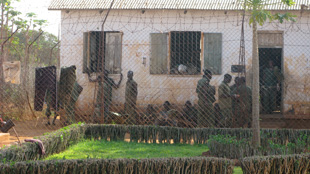 Convicted prisoners outside a cell at Mumbwa Prison. Inmates at prisons with associated farm facilities, like Mumbwa, often work in the fields 7 days a week, where they are frequently beaten and have no toilet facilities or water. © 2009 KATHERINE TODRYS/HUMAN RIGHTS WATCH
Convicted prisoners outside a cell at Mumbwa Prison. Inmates at prisons with associated farm facilities, like Mumbwa, often work in the fields 7 days a week, where they are frequently beaten and have no toilet facilities or water. © 2009 KATHERINE TODRYS/HUMAN RIGHTS WATCH
It’s not a surprise to anyone who knows anything about African prisons to hear that HIV and tuberculosis (TB) rates are staggering, and that health care is virtually nonexistent. Less intuitive is the assertion that I outlined in a recent article that governments and health donors should fund criminal justice reforms as critical HIV and TB interventions.
Disease in African prisons is incubated and spread through a perfect storm of inadequate funding, lack of political will, and a desperate need for policy change. In many African countries, prison conditions are awful, and have been for years. Prisons are often miserably overcrowded. The lack of prompt isolation and treatment or screening for TB among incoming prisoners means that the disease is quickly transmitted in the packed, ...













